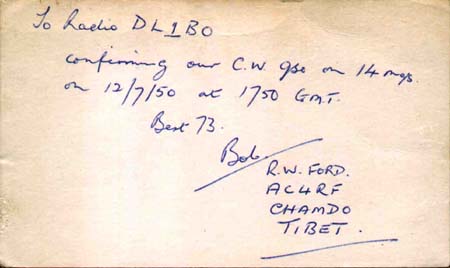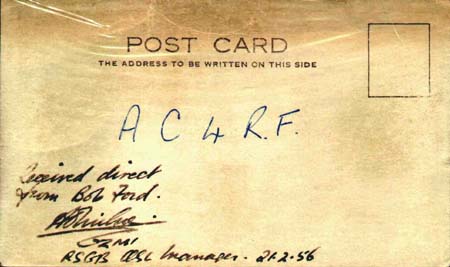


AC4RF 1950 Tibet
Mr. Ford's amateur call was AC4RF, and he was well known on the amateur bands before the fall of Tibet and his confinement. Ford also authored a book, "Wind Between The Worlds", which chronicles his life in Tibet and subsequent imprisonment. As noted in the "Economist" article, he was located in Chambo, and his contact in Lhasa was the legendary Reg Fox - AC4YN. I've read the book and found it very interesting. Ham radio is mentioned prominently.
After his release from prison, Mr. Ford had at least one duty posting in Washington, DC at the British Embassy. This would have been in the 1960s, and a number of USA amateurs had the pleasure of meeting him.
One last bit of trivia concerning AC4YN. Reg Fox was the second holder of that call, which was originally held by Sir Evan Nepean, G5YN, and activated from 1936 to 1939. After WWII Reg Fox used the call. There is a "FOC connection" to AC4YN. When noted journalist Lowell Thomas visited Tibet in the 1950s, his only contact with the outside world was via AC4YN. A good portion of his messages were relayed via Hal Brooks - W9VW in LaPorte, IN and Charlie Mellon - W1FH in the Boston area. AC4YN used a "peanut whistle" and it required good stations and operators to make the grade with him.
Some of you may be interested in his unique life http://www.economist.com/news/obituary/21587201-robert-ford-british-radio-operator-free-tibet-died-september-20th-aged-90-robert-ford John / 9V1VV
Robert Webster Ford, AC4RF
(Silent Key, 1923-2013)
Adapted from Wikipedia, the free encyclopedia
This article is about a British radio operator and diplomat.
Robert Webster Ford (born 27 March 1923 in Burton-on-Trent, died 20 September 2013 in London) was a radio operator and British diplomat who worked in Tibet in the late 1940s.[2] He was one of the few Westerners to be appointed by the Government of Tibet in the period of de facto independence between 1912 and the year 1950 when the Chinese army marched on Chamdo. In 1994, he declared that during the five years he spent in Tibet, he "had the opportunity to witness and experience at first hand the reality of Tibetan independence."
Robert Webster Ford was the son de Robert Ford, a brewery engine-driver, and Beatrice Ford, who lived in Church Road at Rolleston-on-Dove. He attended Rolleston Primary School and Burton-on-Trent Grammar School. As he did not relish the idea of spending the rest of his life in a bank or office in Burton-on-Trent and wanted to travel and see the world, he enlisted as an apprentice in the Royal Air Force when he left school at 16. In 1943, he was posted to India but soon became disillusioned, and jumped at the offer of a job as radio operator in Lhassa, Tibet, at the end of World War II.
In 1945, he joined the British Mission in Lhasa as a radio officer and had an audience with the 14-year-old 14th Dalai Lama in Lhasa. The same year he was transferred to Gangtok, Sikkim, where he worked on British India relations with Tibet. In Sikkim, he befriended Rai Saheb Pemba Tsering,[5] the father of Dr. Pemba, the first Tibetan-born doctor trained in western medicine. When India became independent in 1947, Robert Ford returned to Lhasa and was appointed by the Government of Tibet, becoming the first foreigner to be given an official rank in the country. As Tibetans had a problem in pronouncing "F", "Ford" became Phodo (and later in Kham, he was to become known as Phodo Kusho, "Ford Esquire"). After one year in Lhasa, he was requested to go to Chamdo, capital of eastern Tibet (Kham), to establish a radio link between Lhasa and Chamdo. With three wireless operator students, he left for the city in 1949. They helped the Governor General of Kham, Lhalu Tsewang Dorje, improve defence in Chamdo and the surrounding area. In addition, a direct link was established for the first time between Lhasa and Chamdo. Early in 1950, Lhalu requested Ford shorten the training of the wireless operator students. By that time, new instructors had arrived to train soldiers in the use of Bren guns. Robert Ford wrote that "the Tibetan Army began to look a little less like something out of the Middle Ages."
He was arrested in 1950 by the advancing Chinese army, along with the Governor General of Kham, Ngabo Ngawang Jigme, and other Tibetan officials. The People's Republic of China accused him of espionage, spreading anti-communist propaganda and causing the death of Geda Lama, a vice president of the provincial government of Xikang and envoy from the Chinese government who was to have submitted a 10-point peace proposal to the Lhasa government.
Ford spent nearly 5 years in jail, in constant fear of being executed, and was subjected to interrogation and thought reform. Only in 1954 was he allowed to send a letter to his parents. At the end of 1954 his trial was held and he was sentenced to ten years jail. He was eventually released and expelled in 1955.
In 1957, he published the book Captured in Tibet (U.S. title Wind Between the Worlds) about his experience. The book was reissued in 1990 under the title with a preface by the Dalai Lama and an epilogue by the author entitled "The Occupation".
In 1956 he was appointed at the British Diplomatic Service and served in the Foreign Office in London, Vietnam, Indonesia, United States, Morocco, Angola, Sweden, France and finally as Consul-General in Geneva. The same year, he married Monica Tebbett, a childhood friend. They were married for 55 years and had two sons, Martin and Giles.
He retired in 1987 and was awarded Commander of the Order of the British Empire.
After his retirement, Ford lectured in support of the Tibetan Government in Exile in various countries (the UK, other European countries, Australia and the United States). In 1992, he undertook a countrywide lecture tour in India, at the request of the Dalai Lama. However, the tour was brought to an abrupt end when Ford was put under house arrest in Dharamsala by the Indian authorities as the lectures coincided with Chinese Premier Li Peng's official visit to India. Ford had to return to Britain earlier than expected.
On September 13, 1994, together with other foreigners who lived, visited and worked in Tibet prior to 1950, Ford was invited for lunch by the 14th Dalai Lama, then on a visit to London, to exchange their reminiscences and endorse a statement that Tibet was a fully sovereign country before 1950.
In 1996, Ford was able to arrange the first meeting between the 14th Dalai Lama Tenzin Gyatso and a member of the British royal family. The Dalai Lama met Queen Elizabeth and the Queen mother, with Ford, on 17 July, at Clarence House.
On his 90th birthday, on March 27, 2013, the former radio operator was handed the last of his salary, a 100 Tam Srang note worth 65 pounds, by the Tibetan Government in Exile, at a ceremony in London.
On 13 April 2013, Ford was given the International Campaign for Tibet's Light of Truth Award by the 14th Dalai Lama in Fribourg, Switzerland.
He passed away at the age of 90 on 20 September 2013 in London.
For references see the orginal Wikipedia article "Robert W. Ford," http://en.wikipedia.org/wiki/Robert_W._Ford
Courtesy of DL1BO
Info courtesy of 9V1VV, K8MFO
Addition info courtesy of Wikipedia
Thanks to W5KNE